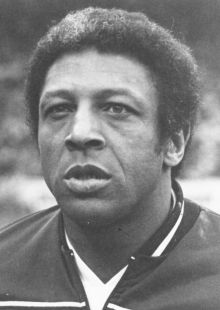Image Credit: Hullfc.com
Rugby League has long been a sport associated with pioneering. The formation of the game itself was a leap of faith, with 22 clubs in the North of England rejecting the stranglehold of the RFU to stand up for their working-class players and form the professional Rugby Football League.
In Australia and New Zealand, the formation of their professional Rugby Leagues followed a similar pattern. Clearly, Rugby League has always been a sport built upon working-class roots and standing up for the lower echelons of society.
This trait also applies to people of colour. In Australia, Rugby League legend Arthur Beetson became the first Aboriginal captain of Australia in any sport, at a time when Indigenous Australians were still classified legally as ‘Flora and Fauna’. The UK’s black sporting pioneer? Clive Sullivan.
Born in Cardiff in 1943, operations to his knees, feet and shoulder had effectively ended his chances of becoming a professional Rugby player. With this, Sullivan decided his future belonged in the Armed Forces, and was stationed at Catterick Garrison in North Yorkshire upon enlisting. Soon selected in an inter-corps Rugby League match on the account of being Welsh, Sullivan ‘accidentally’ lit up the game, scoring a long-range try, despite initially wanting to play badly due to his injuries.
Hull FC soon signed him in 1961 after an unsuccessful trial with Bradford, and Sullivan shone immediately, showing frightening speed and deceptive strength to score 250 tries in 352 games. In 1974, Sullivan joined cross-city rivals Hull KR, scoring a further 118 tries in 213 games. The wingerremains the only player to score over 100 tries at both Hull clubs.
Despite being loved by fans on either side of the Humber Bridge, a feat rare even today, Sullivan’s real career highlights came on the international stage. Having made his debut for Great Britain in 1967, Sullivan was awarded the captaincy five years later, leading the Great Britain side to World Cup victory in 1972. As well as being the first black sportsman to captain a British national team, Sullivan scored a 60-metre try in the final against old enemies Australia, cementing his place as a British sporting icon.
Black History month reminds us of the great contribution black sportspeople have made to British sports in recent centuries, and Sullivan should be no different. Sadly, International Rugby League has long struggled for significant exposure, particularly against its slightly elder brother, Rugby Union.
This, coupled with Great British Rugby League’s recent lack of success on the international stage (1972 was their last World Cup win) has seen the achievements of Sullivan somewhat forgotten when discussing black British sporting pioneers.
However, the significance of Sullivan’s leadership of the Lions to victory in 1972, at a time when more celebrated black sporting pioneers such as Cyrille Regis fought against racism from fans of all clubs including his own, shows that numerous sports have provided black British athletes with opportunities to transcend the games they play, and legends such as Sullivan have grabbed these opportunities with both hands.
If you even happen to be driving into Hull from the West, past the Humber Bridge, you’ll probably take the A63, known to all locals as Clive Sullivan Way. Named after a Welsh Army recruit who managed to unite a divided city, as well as lead a country to World Cup glory, it is named to show young black British athletes that anything is possible, and a sport as great as Rugby can act as a platform for them to become immortal.

